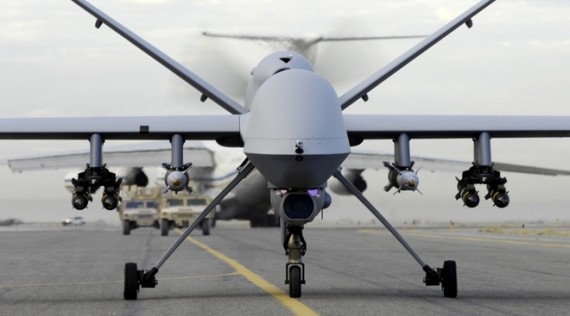Law of Remote Control War
The law of war is not fully clear when applied to modern conflicts.
Charli Carpenter points the the complexity of applying the law of war, which has evolved over several centuries, to modern conflicts:
An example given at the workshop, for instance, is whether the Taliban (if it could) would have the right to target a civilian CIA drone pilot in Langley on her way home to dinner with her family from the compound in which she had recently launched remote missiles against targets in Pakistan. Precedent established by the US would probably suggest yes (assuming collateral damage were minimized and requirements of necessity were met), at least insofar as an equivalent civilian participant in armed hostilities in Pakistan would constitute a legitimate target even when not directly participating due to the ‘continuous combat function’. (I am not myself arguing this formulation is correct; I am drawing out the normative implications of the argument made by the USG on targeted killings.) However the ILA understanding would say no: conditions of armed conflict are not occurring in Langley VA simply because the geographic location is being used to make targeting decisions, therefore the law of armed conflict wouldn’t apply.
While I’ll defer to Charli’s knowledge of the actual state of jurisprudence on this, the USG formulation strikes me as the more reasonable analysis of the situation.
Whether someone is a civilian or military should be largely immaterial; the operative question is whether they are a combatant. Someone who actively kills in war is clearly that. So long as the war goes on, then, I don’t see why a CIA drone pilot in Langley is any different from her counterpart who is a U.S. Air Force first lieutenant and stationed in Kandahar.
As a young cadet, were were assigned Michael Walzer’s classic Just and Unjust Wars. It’s been more than a quarter century now but my recollection is that even a non-combatant factory worker on the home front was considered a legitimate military target if they were making munitions, weapons, or other tools directly related to killing–but not if they were making uniforms, blankets, and other materials which merely support soldiers who kill.
The more interesting question is the status of a stateside intelligence officer studying satellite images and making targeting recommendations. To my way of thinking, that person is a combatant and fair game.







It’s a situation I’ve wrestled with myself, and not come up with a clear answer. We call a lot of the terrorists “illegal combatants” based on international treaties on war, but by that same standard our drone operators are illegal combatants, too. So what if they’re sitting in an air-conditioned trailer in Nevada; they’re still controlling military hardware and carrying out combat operations and committing acts of war.
While I think we’re abiding by the spirit of the law, we are most certainly in violation of the letter of the law. The drone operators are, to the best of my knowledge, not members of the military, not wearing distinguishing uniforms, and not bearing any national insignia. That they’re pretty much halfway around the world from the combat, and in absolutely no danger of being mistaken for non-combatants by the enemy, addresses the intent of the law — but the letter is clear.
And it’s been an issue that needs addressing for at least a year.
J.
It is important that the concept of war be returned to its literal beginnings. When nations engage in war, there are no such things as legitimate or illegitimate targets. One party may chose to limit the scope of annihilation for their own purposes, but annihilation is the outcome the military should be tasked with achieving.
Only by adopting this definition of war and the realization that there are no rules to break, can diplomacy succeed. War needs to once again be made into something that should be avoided.
I agree. It doesn’t matter if the enemy is a 100 yards or 10,000 miles away. When you are fired upon, you have the right to defend yourself and to shoot back. If a Taliban fighter, I hate to call them soldiers, did kill a drone operator here in the United States, they would be no different than one of our soldiers killing one of theirs in Afghanistan. We would have to treat their fighter, when captured, as a POW and not a terrorist.
I agree. The first place we need to start is Congress. We need an up or down vote on a Declaration of War. No Declaration, no war.
Sorry, but the Declaration of War idea is a relic. I’m not saying it should never be used. But the language was written at a time when we had no standing army and our navy was a fishing boat with a joke. A Declaration was necessary to start the raising of an army and the construction of a Navy. And it was a time when the enemy could be months away — as with our first go-round with Tripoli.
We have a standing army, a standing navy, and instantaneous worldwide communication and more or less universal presence. If a ship gets hit by a NK mine is a Declaration of War really the smart answer? Or can we just send a few planes to sink a few of their ships? How about pirates off the Arabian peninsula? How about if some rogue Serb outfit attacks UN forces and they need some air power?
Declaration of War is binary: yes/no. It’s not a binary world. There are lots of gradations in between. And a large number of our conflicts don’t involve a state upon which to declare war.
This approach would make nuance impossible, and sometimes we need nuance. If NK does something annoying do you really want the only response to be all-out war of conquest?
Sounds like the making of a good movie. A group of Taliban migrate to Mexico. They cross the Mexican border into Western United States. Attack a secret military base. Call a news network station. And then demand to surrender and be treated as POW under the Geneva Convention.
A good movie can raise all sorts of moral issues and get people talking.
During WW II we declared war on Germany and Japan. We had a standing army and a first rate navy. I understand during the Cold War when an ICBM flight was less than 30 minutes, there was no time for a Deceleration of War.
How about when a country posses no immediate threat to us like, Afghanistan, Iraq or Libya? If Congress has time to debate then the have time to vote.
SH:
I think in the cases of Iraq and Afghanistan, sure, and I wonder why no one went that way. I assume it was something to do with the POTUS not wanting to surrender power and the Congress being dickless.
As for Libya, that’s not really much of a war. It’s closer to dealing with pirates. So far at least.
Technically we are still at war with North Korea. We signed an Armistice Agreement and not Peace Treaty.
That we can agree on.
I agree with you you there are a lot of trouble spots where the sledge hammer approach would be inappropriate. For example when the Cole got bombed, their would be no reason to declare war on Yemen. Unless we were just looking for a reason to invade and conquer like we did in Cuba when the Maine got sunk.
It’s amazing how widely applicable that assumption is, eh? And depressing.
Not trying to be argumentative here, Michael, but what do you see as the substantive difference between the AUMF and a declaration of war?
“When nations engage in war, there are no such things as legitimate or illegitimate targets.”
I disagree. We have spent years developing rules which have worked pretty well to diminish damage to civilians. Yes, these are sometimes ignored by everyone, but when it persists, the existence of laws and codes of conduct about such killings provide pressure to make them stop. It is in our long term benefit to follow these laws, including the repudiation of torture.
Steve
History suggests that the organized use of irregulars by states is imprudent. As to whether it is itself a war crime I will leave that to experts in the law of war. But I believe that it is worse than a crime, it is a mistake.
Blurring the distinction between combatant and non-combatant makes everybody a legitimate target. We despise that in our enemies. How can we credibly defend it on our own part?
Steve,
I would argue that these rules that have been evolving over the past century are leading the world to a state of endless war. As technology grows to isolate civilian casualties, populations become more detached from the actions of their governments. By bringing the horror of war “home” (so to speak), the realities make an indelible impression on those who allow, either through action or inaction, their leadership to put them into a position of possible annihilation.
War should be an all-or-nothing proposition. You either go into it to win decisively or you don’t play.
The individuals who control the drones are not the same as mercenaries or irregulars hired by a state to attack another. They also aren’t civilians who are taking up arms against an adversary. There are certainly laws of armed conflict and IHL which applies to both of these conditions, but they don’t apply here.
Is there anyone who does not agree that these individuals are acting under direct control, support, and finance of the United States? If this is so, then it doesn’t matter if they wear a uniform or not– they qualify as armed combatants of the United States under several precedents in international law. For this reason, they are subject to the same RoE as US soldiers and are at the same legitimate risk for an adversary’s act of self-defense– although the odds of a small group like the Taliban tracing down a drone pilot is small.
You mean like the bombing of Japan or Germany during WW II? You cannot win a war by just defeating an army in the field. You have to destroy a nation’s ability to wage war and break the will of the civilian population. As long as the civilian population is safe to produce war material and send replacements to the front lines, war is unwinable.
Americans can’t conceive of a war that would affect their schedule of television shows, let alone endanger them in any way. From this perspective grows ideas such as “legitimate targets” and “rules of war”. The lunacy has progressed to the point that U.S. soldiers are placed into situations where they wait to be fired on before engaging the enemy.
Civilians under the rule of even the most despotic tyrants would be more apt to rise up in rebellion if they knew that antagonizing a country like the U.S. meant near certain incineration of every living creature in a population center. The choice would become simple enough for any culture to understand – either live in peace by foregoing potentially threatening actions and alliances or risk becoming a rubble-strewn ash pit. When faced with that sort of reality, even meeting Allah loses some of its appeal.
Although certain segments of our society will claim that it’s not fair or “what gives us the right?” to wage war in such a decisive, on-sided fashion, it is because we have made the investment over the decades to put a military in place that can impose our will throughout the world. As much as others would like to deny it, if that power rested with anyone else but the U.S., it would have already been used for more nefarious purposes.
“We have spent years developing rules which have worked pretty well to diminish damage to civilians. ”
maybe so, but a few moments of boredom or a desire to kill something can make a century of rule making moot.
Here’s a transcript of a U.S. drone strike that killed twenty Afghan civilians.
Everyone from the special forces commander on the ground to the drone pilot back in the United States very carefully followed the rules for over 4 hours before a U.S. helicopter came in and blew away 20 civilian lives:
I read the whole thing, takes a while but it is fascinating.
One thing stands out is the drone pilot’s overwhelming urge to kill something…anything.
http://documents.latimes.com/transcript-of-drone-attack/
@jwest: They were teaching Walzer at West Point in the 1980s; it’s hardly a new phenomenon. And the notion of limiting harm to non-combatants in war goes back centuries. Indeed, it’s only in with the advent of modern technologies that it was even much of an issue: If you’re fighting with swords and other close combat weapons, there’s next to zero chance of collateral damage.
Boyd. A quick note to say that I’m not avoiding. Just on my phone right now and my thumb is not up to the job.
James,
It just comes down to what the definition of “collateral damage” is. If you’re fighting with swords and kill all the males, enslave the females and burn the villages, there is not much left to damage.
In the modern world, civilians hold culpability for the actions of their government, regardless of whether that government is elected or imposed. If through inaction a population cedes the governance of their country to people who would risk certain destruction by antagonizing a country like the U.S., they are placing themselves in a position to suffer the same fate as their leaders.
Without a stance that views civilians in this light, the military and war is little more than a team and sport, to be played when time and money permit.
U.S. laws on landarfare (until 1956) were essentially based upon General Order No. 100 from the American Civil War (a/k/a Lieber’s Code). It had an interesting provision that stated the goal of these rules was to place to the extent practical the burdens of war on the combatants to the benefit of non-combatants, and as between combatants place the burdens on the irregular combatants in favor of the regular.
I think that remains a beneficial, yet flexible ethic, that remains relevant. Some of what we are fighting can be seen as civil wars, or perhaps preemptive civil wars.
I highly recommend the book Wired for War by Peter Singer I believe. It is a fascinating look into drones and the changing face of warfare. One of many topics it covers is how the idea of war being somehting you go “away” to do is changing into instead a day job where drone pilots show up at 9 leave at 5 and after spending 8 hours causing people to explode horrifically go and sit and eat with their families at the dinner table. You might imagine such a lack of distance between the combat and civilization erodes the justifications of “what happens over there is on a different moral plane than what happens here.”
It’s really quite fascinating and horrifying, both.
It seems our goal is to reduce modern warfare to little more than a video game. The combatant sits in a nice air conditions room in a nice comfortable chair in front of a control panel and wages war. The enemy is reduced to nothing but poor graphs on a video screen. Clean, neat, sterile, no blood, no gore, no heroics, no guilt.
To use my ethic pointed to earlier, I don’t think I care whether war becomes “remote.” I think there are far too many examples of deaths caused by the instinctive fear of self-preservation that could be eliminated in a “remote” context. No, I think the question is Westphalian — what are the costs to the international order from the reduced cost of policing “states” in chaos.
“It’s been more than a quarter century now but my recollection is that even a non-combatant factory worker on the home front was considered a legitimate military target if they were making munitions, weapons, or other tools directly related to killing–but not if they were making uniforms, blankets, and other materials which merely support soldiers who kill.”
I think it was in Len Deighton’s book, Fighter: The True Story of the Battle of Britain, that I read this. During the battle, the rule, observed by both sides was, if you bailed out over your own territory, while you were in the air in your chute, you were fair game. However, if you bailed out over enemy territory, you’re weren’t fair game in your chute. The logic being, if you bailed out over your own territory, you would return to the fight another day; over enemy territory, you wouldn’t.
“In the modern world, civilians hold culpability for the actions of their government, regardless of whether that government is elected or imposed. If through inaction a population cedes the governance of their country to people who would risk certain destruction by antagonizing a country like the U.S., they are placing themselves in a position to suffer the same fate as their leaders.”
That’s a stupid point of view , and I would like to see the authoritative source for it (and I don’t mean the Book of War by Jwest). It overlooks completely the fact that in countries such as you describe, the government usually, if not always, exercises a complete monopoly on the use of force. No 2d Amendment in those places, you know.
You’re pretty gungy when it comes to wholesale killing. Have you ever been in the service?
http://en.wikipedia.org/wiki/War_crime
Territory doesn’t matter
Makes sense. The German people turned the rule of their country over to the Nazis. The German people suffered the same fate as their Nazi leaders. No one commended the Allies for the loss of civilian life
I just love all the armchair warriors here who have never heard lead flying by. In Viet Nam, anybody (VC or their sympathizers) who stayed on the other side of a water buffalo too long got shot because they were usually hiding weapons on that side of the buffalo. I heard tell of one outfit that shot at big breasted women in a ‘ville. Why? There were no big boobs in the ‘Nam- the boobs were usually hand grenades. Little tidbits of info like that kept you alive.
We ought to bring back napalm and flamethrowers, IMHO.
Good old Vietnam, what a waste.
Vietnam, that place where the war crimes by our side were so flagrant even the US media eventually had to take note.
Good times indeed.
It seems we went from one extreme to the other. In Nam we had little regard for human life, except when it came to bombing North Vietnam. In Afghanistan our rules of engagements are so bizarre, I’ll bet our soldiers have to get permission from a lawyer at the Pentagon in order to return fire.
Boyd:
Without transgressing into legal territory, I interpret the Declaration of War as being a sort of national commitment — WW2 style, all in, victory or bust. The Authorization to Use Military Force seems smaller in scope, a less committed sort of action, more Granada than WW2.
But that’s not a statement about law, obviously, more of a question of public relations.
I think the POTUS needs to be able to respond militarily without either of the above. But I also think we’re in a murky place when the chief executive can just go around blowing people up more or less as the whim strikes him. Of course Congress can always cut off funding, but as a practical matter once we are involved it’s a hell of a hard thing to do.
I actually wonder if we should look to the sorts of rules that police officers work under. Not to be taken literally, obviously, but cops have parsed the thing down to a fine degree.
Just as Congress has abdicated the responsibility of going to war to POTUS, POTUS has abdicated that responsibility of committing our troops to NATO and the UN.
Thanks for your response, Michael, but I can’t keep from feeling you didn’t really answer my question. Let me rephrase it this way:
What is the deficiency in an AUMF that keeps it from being a Declaration of War? Is it merely the absence of the word “war?”
I believe there are laws that get triggered when we go to war. Real war. As in declared war. These do not get triggered by some nambly pambly police action authorized military force.
At least that’s not the usual perspective on 9/11 (or any such future attack) that one hears from conservatives.
That would be true if our government was responsible of 9/11
Boyd:
There I think you may be asking for a legal definition, and for excellent reasons I avoid pretending to understand law.
I think as a practical matter it’s a political/PR issue. I think to the American people a Declaration of War reads as a 10 out of 10 on the Holy Sh*t scale. The AUMF reads as a 7 or 8 out of ten. When I object to the DofW it’s as a practical political matter, not a legal one.
@Tlaloc: But what is it about an AUMF that makes it not a declaration of war? What makes it namby-pamby? What would Congress have had to change to turn it into a declaration of war? Is it the use of the word “war,” or is it something else?
@Michael: That’s cool, and I understand your point. But it seems you must agree that for someone to say “Invading Iraq was illegal because Congress never declared war” requires the claimant to cite why the AUMF doesn’t satisfy the Constitutional requirement, right?
And further, it seems that there’s a huge gulf (no pun intended, but I’ll take it) between invading Iraq and Afghanistan, both of which actions were specifically authorized by Congress, and, if it ever happens, invading Libya, where Congress has never been asked, much less given their blessings. Don’t get me wrong, I believe we’re nowhere close to that in Libya so far. And while I’ve always disagreed with President Obama’s decision to push for whatever intervention we have pursued so far, there’s no comparison, either for or against, between Libya and either Iraq or Afghanistan.
Boyd:
I’m wondering if you may have me confused with someone else. Or it may be that I’ve expressed myself poorly. I basically support the LIbya move (with all the usual caveats that I don’t have any idea if it will all work out in the end.)
I think in a future world we’ll have international law that covers these sorts of actions. But we’re not there yet. We construct legal fictions around the UN and wink-wink discover treaty obligations. But I think it’s window dressing for pursuing what we see as our own interests. I’m fine with that at this time, but I recognize that it’s a less than ideal situation legally and philosophically, and believe we’ll need to evolve an international system that goes beyond simply asserting our own rightness.
Let me be clearer. The belief that
is a sufficient justification to commit violence against civilians, is a belief that provides moral justification for terrorism on the part of any group or country that has grievances against the US (or anyone else, for that matter) Hence my 9/11 comment.
But, I think most people (at least, most people reading this blog) would agree that 9/11 and other acts of terrorism of that nature (e.g. the London subway bombings) are deeply immoral acts, and I don’t think we would be materially better off if our attitude towards such things was to shrug and say, :”That’s just how the game is played.”
And to head off one possible response: I’m not a pacifist, and I don’t think there are easy answers to how wars can be conducted given the world we live in.
@Michael: To bring it around full circle, what prompted my initial question for you was your stated assumption that the AUMF for Iraq, for example, was due to POTUS not wanting to surrender power, and Congress being dickless. This just doesn’t make sense to me when it appears that there isn’t any substantive difference between an AUMF and a declaration of war.
It has nothing to do with anyone’s support or opposition to any of these…umm…kinetic military actions of varying scales. Boiled down to basics, and leaving Libya out of it (since it’s currently such a small effort), it seems to me that if the President asks Congress, “Should we go fight?” and Congress’s response is “Yes,” the form of that conversation is irrelevant, and the conversation itself satisfies the spirit of Article I Section 8 of the Constitution, at least for layfolk such as us.
I’m afraid that begs the question—it’s circular. The question at hand is whether, indeed, “these individuals” are subject to the same RoE as U. S. soldiers and under the UCMJ. How do you know? What are the controls?
Quite to the contrary I strongly suspect that the Pentagon, i.e. U. S. military officials, have no day-to-day control over “these individuals”. Indeed, that’s why the different organizational structures exist: to remove the institutions in question from military control.
jwest, I read of a study done after WWII about the effectiveness of the various bombing campaigns on civilian morale. From the British to the Germans to the Japanese the effect was the same: A hardening of their willingness to endure against their “common enemy”.
Sorry, no link as I can not remember where I read it and have no idea of how to google it.
There was no moral justification for what the terrorist did on 9-11, other than the fact that we existed. It achieved nothing other than terror for the sake of terror. Most of the terrorists were Saudis. Did we attack Saudi Arabia? No, there was no justification for the attack against us on 9-11.
The bombing in Spain was different. It’s purpose was to influence the Spanish election and to get Spain out of Iraq and it worked. If the Taliban began carrying out terrorist attacks on our soil, as reprehensible as it would be, it would be morally justified. We go over there and kill their civilians they come over here and kill ours. The Germans bombed London, the Brits bombed Dresden. Simple tit for tat.
Perhaps if we are concerned about the loss of civilian life here in the United States, we should put pressure on Congress to rein in the President’s justification for attacking counties on a whim. Actions have consequences.
http://articles.latimes.com/1990-09-23/opinion/op-1578_1_air-power
Gregory M. Grant is a military analyst at the Center for Strategic and International Studies. He is co-authoring a book on the operational lessons of recent wars.
http://en.wikipedia.org/wiki/September_11_attacks#Motives
Tom P,
“…the effectiveness of the various bombing campaigns on civilian morale. From the British to the Germans to the Japanese the effect was the same: A hardening of their willingness to endure against their “common enemy”.
That doesn’t really hold up to reality, does it?
Germany and Japan both took a concentrated pounding, hundreds of thousands killed and now they are two of our closest allies.
Boyd:
Sorry, now I do see what you were saying. (I’m more distracted than usual: racing a deadline and being driven crazy by lawyers.)
I think the AUMF was invented as a thing which was one step short of a Declaration, a fiction perhaps, that it was not quite as serious. And I think that’s how people see it. Not quite a war.
The debate has raged for as long as I remember (back to Vietnam) over whether of not a DofW was necessary, with those opposing a given action generally demanding one as a sort of “put up or shut up,” and those supporting the action generally content to do something less grand and imposing: either an AUMF or simply sticking their fingers in their ears and singing “La la la,” so as not to hear the explosions.
The DofW is presented in political and public relations terms as a re-assertion of Congressional power. It’s gotten a bit meta, but I think it’s seen as that by both ends of Pennsylvania Avenue. So the POTUS won’t agree to anything that seems to be a reassertion of Congressional power, and the Congress generally won’t grab for it. They’ll talk a good game, but then they’ll put out another AUMF which offers a degree of public relations nuance (probably a good thing) and avoids seeming like a Congress vs. President battle.
Hence my initial remark
One other thing occurs to me as well: a Declaration of War just sounds too big and solemn for what we’ve been doing. It feels as if a Declaration has to be between roughly equal powers. Us and Britain in 1812, us and Germany on both occasions, us and Japan.
Somehow when you’re the world’s only superpower and you’re fighting a country that’s perhaps the equivalent of the state of Texas it seems disproportionate.
Hey, now, let’s not be bringing Texas into this!
So it sounds to me like you’re saying that the difference between the two is political, not legal. Okay, I’m fine with that, but I don’t see why the President and Congress should get even more contempt heaped on them because they’re politicians, and don’t want to call a particular conflict “war.”
There was no justification for the attack against us on 9-11. I should have said no rational justification. I forgot Muslims are not rational beings. We were in Saudi Arabia at the request of the government. I don’t believe that Al-Qaeda was in any position to dictate policy to the Saudi goverment.